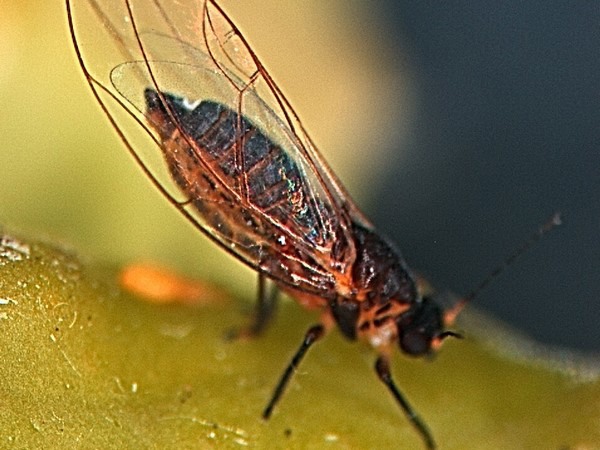The Valencian Association of Farmers (Ava-Asaja) demands that the Spanish Government and the European Union (EU) assess and implement drastic measures to prevent the advance of the Trioza erytreae insect, the vector of the Huanglongbing (HLB) disease -the most devastating disease for citrus in the world that is known as citrus greening or yellow dragon disease- after learning that this insect had already reached Algarve, in southern Portugal. This insect's advance from the north and center of the Portuguese country to the citrus fruits of the Algarve increases the possibility that this transmitting vector and the HLB bacteria will reach the citrus farms of Huelva and the rest of Spain and Europe.

Female Trioza erytreae.
Ava-Asaja urged authorities to take all the scientific actions possible to stop the spread of this plague or, at least, to slow down the speed of its geographical progression. The agrarian organization highlighted an ambitious plan endowed with community funds aimed at promoting lines of research, breeding, and carrying out a massive release of highly effective parasitoids against HLB transmitting vectors.
In this regard, the Tamarixia drii predator has managed to reduce the presence of Trioza erytreae by more than 90% in the citrus farms investigated in the Canary Islands. Meanwhile, there are international studies on parasitoids that could also combat the other HLB vector, Diaphorina citri, which is even better adapted to the Mediterranean climate.
In the event that the bacteria arrive, the association urges the exploration of stronger complementary measures such as cutting down infested trees because, just as with Xylella fastidiosa, there still is no cure for this disease that has caused unaffordable losses for citrus growers and the uprooting of trees in the countries it has affected. Finally, Ava-Asaja asked the Spanish Government to work hand in hand with the Portuguese executive so that they are informed of the evolution of the situation and can act in the most coordinated and forceful way possible.
“The terrible news we've received about the HLB vector is further proof of the little seriousness and rigor with which the European Commission toys with agricultural pests and diseases. In recent years, they have been unable to prevent the entry and expansion of many pests and diseases coming via imports from third countries, such as Xylella fastidiosa, South African cotonet, or the almond wasp. Now we are facing the worst threat to the world's citrus industry. In the absence of curative solutions, the best medicine for HLB is prevention. However, that may not be enough so we might have to take stronger measures,” stated the president of Ava-Asaja, Cristobal Aguado.
For more information:
Ava-Asaja
Tel.: +34 963 804 606
info@avaasaja.org
www.avaasaja.org
